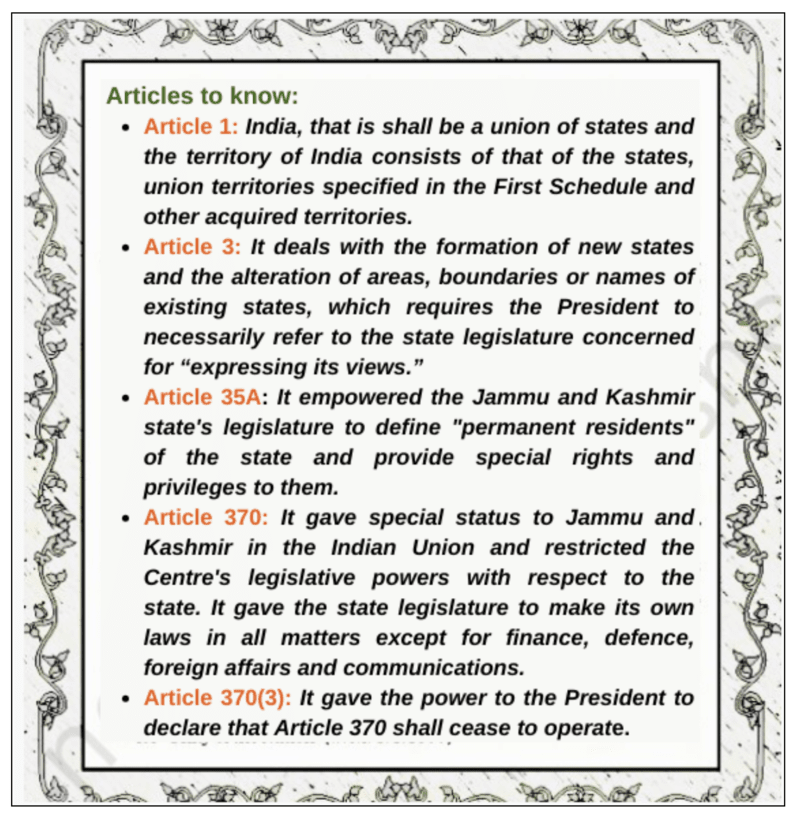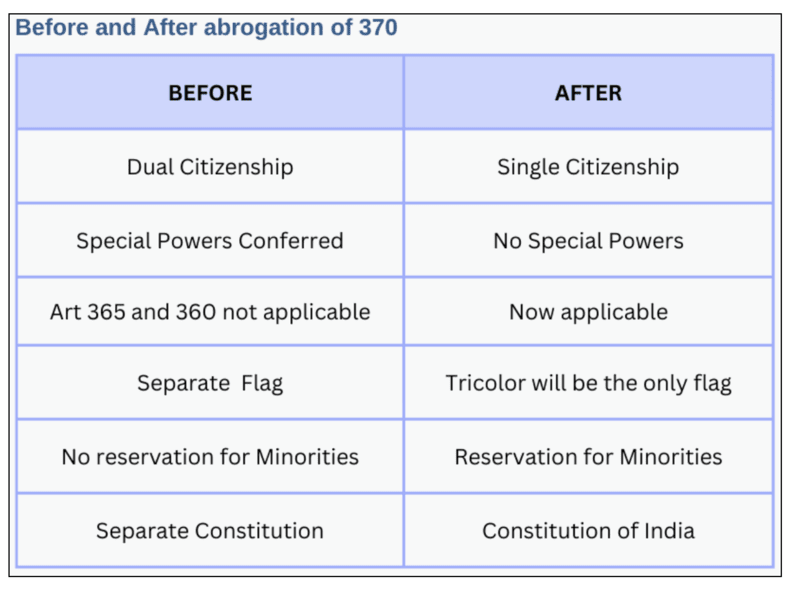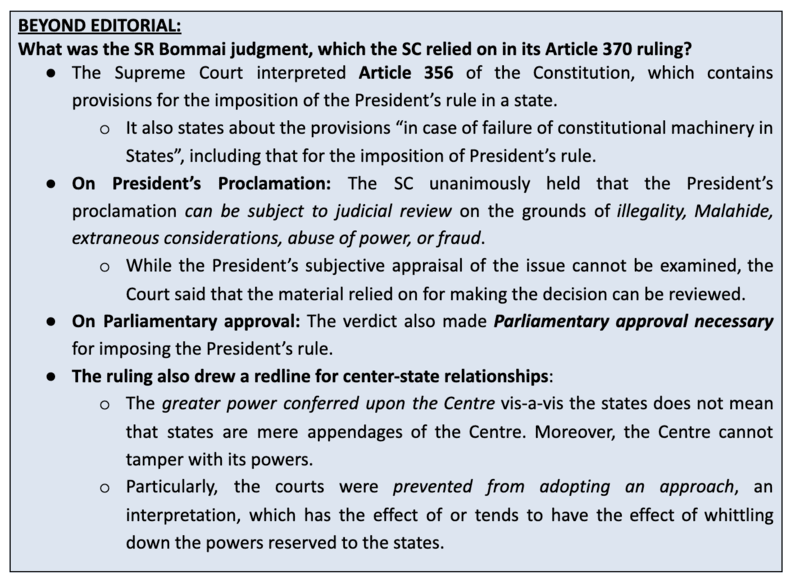SC Verdict on Article 370
“Federalism isn’t about states’ rights. It’s about dividing power to better protect individual liberty.” - Elizabeth Price Foley
Relevance: GS II (Polity)
- Prelims: Important Articles related to J&K
- Mains: Federalism – Issues and Challenges
Why in the News?
A five-judge Constitution bench, presided by Chief Justice of India (CJI) DY Chandrachud, held the Constitutional order that revoked Article 370 as valid.

About the Supreme Court Ruling:
- A Constitution Bench headed by Chief Justice of India D.Y. Chandrachud held that Article 370 was intended to “enhance constitutional integration between the Union and the State of Jammu and Kashmir” and not cause any “disintegration”.
- Previously, the Abrogation (Repealing) of Article 370 in 2019, made Jammu and Kashmir on par with the other States. The entirety of the Indian Constitution would now apply to Jammu and Kashmir.
There are a Few Important Implications from this Judgment:
- The challenge of a standstill Government: According to the present CJI, every decision taken by the Union on behalf of the State during Presidential rule is not open to challenge. This may lead to the administration of the state to a standstill.
- This also calls upon questioning the power of every citizen, in principle, expecting the courts to be able to act as a check on the government.
- Challenges to fundamentals of the Constitution: The court has held that it is not going into the question of whether parliament can convert a state into a union territory, and left this open.
- Previously, during the reorganization of Ladakh as a UT was upheld that Article 3 allowed a portion of the state to be made as a UT. (The court said that it is doing so because the Solicitor General has promised that statehood will be restored)
- A key question is about arrogating parliamentary powers to decide on the region’s behalf and stripping down their presence completely. This also challenges Article 1 of the Indian Constitution.
- This is embarking on making fundamental changes to India’s federal structure, where states are the central building blocks.
- Setback for ‘One Nation and One Election’: The court directed the Election Commission of India to hold elections “by September 30, 2024”, which was interesting as it effectively meant directing an autonomous body (the Election Commission) which is meant to decide on when to hold polls independently.
- Jammu and Kashmir has not seen assembly elections in nearly a decade; the last time polls were held was in five phases between November and December 2014.
- It is also a setback to the Union government’s current favorite theme of ‘One Nation One Election’, or simultaneous polls in the country.
Strengthening the spirit of Integration - “Ek Bharat, Shreshtha Bharat”:
- Integrating Indians by abrogating Article 370:

- Integrating Indians by abrogating Article 35A:
- Article 35A of the Indian Constitution was an article that empowered the J&K state's legislature to define permanent residents of the state and provide special rights and privileges to them Non-permanent residents of the state, even if Indian citizens were not entitled to these 'privileges'.
-
- For Weaker sections:
-
-
- Under this provision, sanitation workers working in the erstwhile state for decades were not given equal rights like that of permanent residents of J&K. This discrimination continued till the provision was abrogated in 2019.
- This provision was also discriminatory for women. If any Kashmiri women marry an outsider or a non-Kashmiri then she will not be able to use her Property Rights.
- Moreover, the SC judgment of 2002 held that the property rights of these women can be used but would be limited to herself and not her kids.
-
Between the lines: A tilt in Federal Balance towards Centre
The Supreme Court, in upholding the abrogation of Article 370 of the Constitution, seemed to tilt the federal balance in favor of the Union.
- Powers of the Legislature:
-
- Since the state of Jammu and Kashmir was under President’s rule, the Parliament exercised the “powers of the Legislature.” Hence, the President of India referred the Jammu and Kashmir Reorganisation Bill, 2019 to the Parliament under the provision of Article 3 of the Constitution of India for its views.
- Challenge against unilaterally removing statehood:
- The petitioners had framed a key challenge against removing statehood to Jammu and Kashmir because the President could not have unilaterally made such a move.
- However, the SC in its ruling falls back on the 1994 landmark ruling in SR Bommai v Union of India to hold that such unilateral action is permissible as long as it is not “mala fide.”

Conclusion:
In one way, the abrogation of Article 370 moves history forward. It is an attempt to cut the ‘Gordian knot’ that the settlements of the late ’40s and ’50s left us with. We shall see whether it succeeds. Indian politics itself is changing. The Supreme Court is trying to facilitate the government’s new approach to Kashmir, without reassuring anyone that it has the integrity to uphold the Indian Constitution, in whose name it speaks, in full measure.
Mains PYQ
Q. To what extent is Article 370 of the Indian Constitution, bearing marginal note “Temporary provision with respect to the State of Jammu and Kashmir”, temporary? Discuss the future prospects of this provision in the context of Indian polity. (UPSC 2016)
Q. The political and administrative reorganization of states and territories has heen a continuous ongoing process since the mid-nineteenth century. Discuss with examples. (UPSC 2022)

